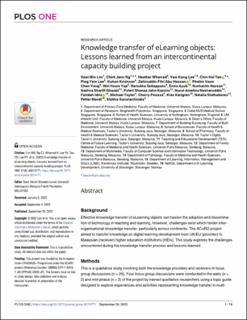| dc.contributor.author | Lim, Hooi Min | |
| dc.contributor.author | Ng, Chirk Jenn | |
| dc.contributor.author | Wharrad, Heather | |
| dc.contributor.author | Lee, Yew Kong | |
| dc.contributor.author | Teo, Chin Hai | |
| dc.contributor.author | Lee, Ping Yein | |
| dc.contributor.author | Krishan, Kuhan | |
| dc.contributor.author | Fitri Bin Abu Hassan, Zahiruddin | |
| dc.contributor.author | Yong, Phelim Voon Chen | |
| dc.contributor.author | Yap, Wei Hsum | |
| dc.contributor.author | Sellappans, Renukha | |
| dc.contributor.author | Ayub, Enna | |
| dc.contributor.author | Hassan, Nurhanim | |
| dc.contributor.author | Shariff Ghazali, Sazlina | |
| dc.contributor.author | Jahn Kassim, Puteri Shanaz | |
| dc.contributor.author | Nurul Amelina, Nasharuddin | |
| dc.contributor.author | Idris, Faridah | |
| dc.contributor.author | Taylor, Michael | |
| dc.contributor.author | Poussa, Cherry | |
| dc.contributor.author | Karlgren, Klas | |
| dc.contributor.author | Stathakarou, Natalia | |
| dc.contributor.author | Mordt, Petter | |
| dc.contributor.author | Konstantinidis, Stathis Th. | |
| dc.date.accessioned | 2023-03-16T13:10:43Z | |
| dc.date.available | 2023-03-16T13:10:43Z | |
| dc.date.created | 2022-10-05T20:37:40Z | |
| dc.date.issued | 2022 | |
| dc.identifier.citation | Lim, H. M., Ng, C. J., Wharrad, H., Lee, Y. K., Teo, C. H., Lee, P. Y., ... & Konstantinidis, S. (2022). Knowledge transfer of eLearning objects: Lessons learned from an intercontinental capacity building project. PLoS One, 17(9), e0274771. | en_US |
| dc.identifier.issn | 1932-6203 | |
| dc.identifier.uri | https://hdl.handle.net/11250/3058814 | |
| dc.description.abstract | Background
Effective knowledge transfer of eLearning objects can hasten the adoption and dissemination of technology in teaching and learning. However, challenges exist which hinder inter-organisational knowledge transfer, particularly across continents. The ACoRD project aimed to transfer knowledge on digital learning development from UK/EU (provider) to Malaysian (receiver) higher education institutions (HEIs). This study explores the challenges encountered during the knowledge transfer process and lessons learned.
Methods
This is a qualitative study involving both the knowledge providers and receivers in focus group discussions (n = 25). Four focus group discussions were conducted in the early (n = 2) and mid-phase (n = 2) of the project by trained qualitative researchers using a topic guide designed to explore experiences and activities representing knowledge transfer in multi-institutional and multi-cultural settings. The interviews were audio-recorded, transcribed verbatim, and checked. The transcripts were analysed using thematic analysis.
Results
Five main themes emerged from this qualitative study: mismatched expectations between providers and receivers; acquiring new knowledge beyond the professional "comfort zone"; challenges in cascading newly acquired knowledge to colleagues and management; individual and organisational cultural differences; and disruption of knowledge transfer during the COVID-19 pandemic.
Conclusion
This study highlights the need to create a conducive platform to facilitate continuous, timely and bi-directional needs assessment and feedback; this should be done in the early phase of the knowledge transfer process. The challenges and strategies identified in this study could guide more effective knowledge transfer between organisations and countries. | en_US |
| dc.language.iso | eng | en_US |
| dc.publisher | PLOS | en_US |
| dc.rights | Navngivelse 4.0 Internasjonal | * |
| dc.rights.uri | http://creativecommons.org/licenses/by/4.0/deed.no | * |
| dc.title | Knowledge transfer of eLearning objects: Lessons learned from an intercontinental capacity building project | en_US |
| dc.type | Peer reviewed | en_US |
| dc.type | Journal article | en_US |
| dc.description.version | publishedVersion | en_US |
| dc.rights.holder | The authors | en_US |
| dc.subject.nsi | VDP::Samfunnsvitenskap: 200 | en_US |
| dc.source.volume | 17 | en_US |
| dc.source.journal | PLOS ONE | en_US |
| dc.source.issue | 9 | en_US |
| dc.identifier.doi | 10.1371/journal.pone.0274771 | |
| dc.identifier.cristin | 2058953 | |
| cristin.ispublished | true | |
| cristin.fulltext | original | |
| cristin.qualitycode | 1 | |

